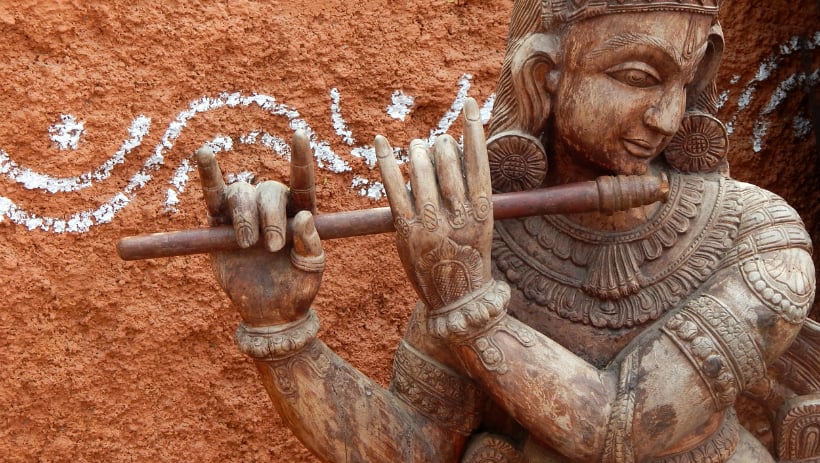
The word guru is a well-known import from the ancient Sanskrit vocabulary. In Sanskrit, it means a revered teacher who is firmly grounded in knowledge. While the word guru has since received a number of extended meanings in English, this article will look back to its roots.
A Spiritual Expert
A guru is a specialist in spiritual knowledge. Spiritual knowledge pertains to the Absolute Truth, the soul and their relationships, as well as to how matter interacts with spirit. While the primary responsibility of a guru is teaching these subjects, their full “job description” can include:
- Role modeling
- Developing and supporting individualized education programs for needy students
- Providing living facilities for boarding students
- Overseeing ceremonies of matriculation, graduation and other significant life events
- Counseling students
- Delivering public lectures at special events, and more
The hardships which we souls face due to forgetting our relationship with the Absolute Truth, or God, spark compassion in the heart of the guru. Motivated by the desire to alleviate the troubles we experience, the guru answers essential questions beginning with, “Who am I really?”
These teachings develop beyond problem solving to tasting joy in the Absolute. In the advanced stages, a student of a guru becomes a guru and shares these teachings anew. In this way the message flows on through the ages, becoming sweeter and more compelling at every stage.
A guru’s teachings are not for sale. The only learning requirements are for the student to listen, apply themselves to the lessons and ask questions. The guru is dedicated to teaching, and so he or she functions as a non-profit entity, supported by donations and volunteer services.
Even those who prefer to be self-taught still rely on quality information from third-parties. Traditional education is supported by shared expertise, which was itself developed through hard practice. Taking help from a qualified guru can save years (or lifetimes!) of trying to figure everything out alone.
An Upholder of Tradition
The guru presents knowledge given in ancient spiritual literature. We say literature, but this knowledge, also called the Vedas, predates any written form. This oral tradition has been passed down from guru to disciple since prehistory, and is still being taught by gurus today.
Gurus don’t create these teachings. The Vedas were, strictly speaking, never created. Rather, they are eternal. This body of spiritual knowledge is one of the eternal energies of the Absolute Truth, meant to uplift the souls from the control of matter, into spiritual freedom.
The role of guru as an expert teacher is baked into these eternal teachings themselves. Here are some references from the Vedas and related literatures about the guru:
The value of learning from a guru:
One who wants to know the Absolute Truth scientifically must approach a bona fide spiritual master and offer him everything required for sacrifice. Such a spiritual master must be fixed in the truth, having heard it in disciplic succession.
(Mundaka Upanishad 1.2.12)
Only unto those great souls who serve guru and Krishna (God) with implicit faith is the import of the Vedas fully revealed.
(Svetasvatara Upanishad 6.23)
The qualifications of a guru:
A sober person who can control the urge to speak, the mind, the urges of anger, the tongue, belly, and genitals is qualified to make disciples all over the world.
One who is devoted to Vishnu (God), even if born in a family of dog-eaters, may be a guru. (Hari-bhakti-vilasa)
False gurus:
One who accepts disciples for personal service and fame is unfit to be a guru.
(Vishnu Smriti)
Many gurus take advantage of their disciples and plunder them. They exploit their disciples for sex, and use them to amass wealth, but a geniune guru who can remove a disciple’s misery is very rare.
(Gaudiya-kanthahara 1.48)
Both an Individual and Representative
The guru is not God, but an individual soul. The Absolute Truth has an energy called guru-tattva, which empowers individual souls to serve as guru. Traditionally, both the individual acting as a guru, and the guru-tattva are respected to the same degree the Absolute Truth is.
The reason for this degree of respect is because that empowering energy, or guru-tattva is divine. The dynamics of relating with the guru are carefully regulated by God personally. For example, in Srimad-Bhagavatam (11.17.27), Krishna says “Know the spiritual teacher as Me.”
Individual tastes, artistic preferences, etc. which vary from one guru to the next point to a guru’s individuality. The individual personality of the guru may come out in lighter, more casual exchanges as well, but the general tenor of a guru-disciple relationship is naturally quite formal.
The Guru Today
Much of this article looked back to ancient sources to establish the nature and role of a guru, but gurus and disciples continue to be a vibrant force for positive change in the world today. Time, place and circumstance are considered when sharing eternal truths in a rapidly-changing world.